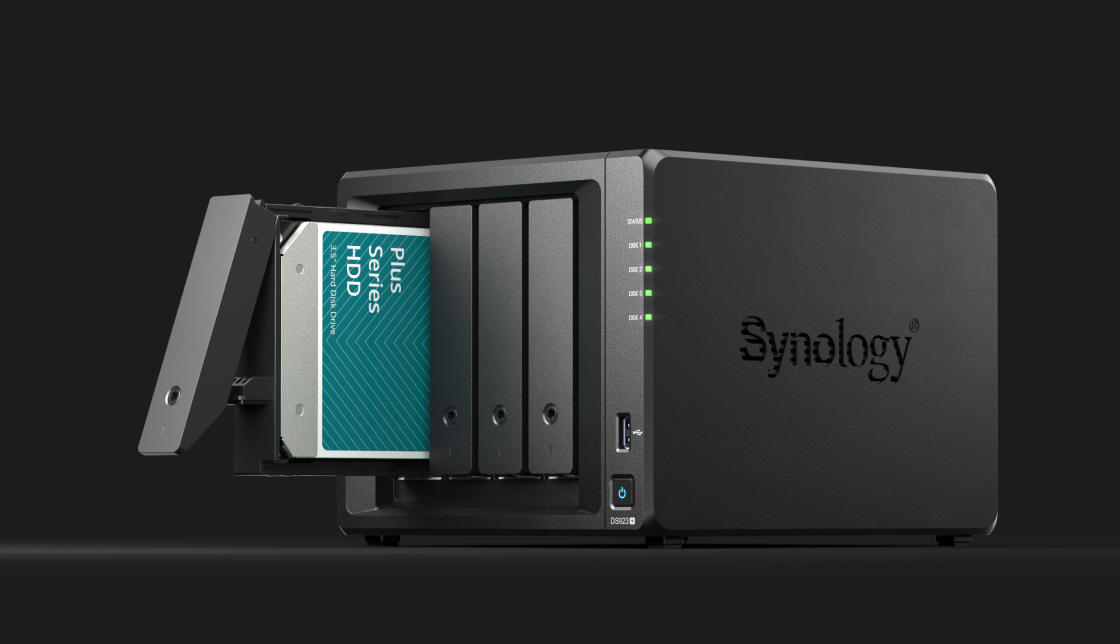
ARSTECHNICA.COM
Synology could bring “certified drive” requirements to more NAS devices
European test drive
Synology could bring “certified drive” requirements to more NAS devices
German press release suggests expansion of the company's "integrated ecosystem."
Kevin Purdy
–
Apr 17, 2025 2:19 pm
|
11
Credit:
Synology
Credit:
Synology
Story text
Size
Small
Standard
Large
Width
*
Standard
Wide
Links
Standard
Orange
* Subscribers only
Learn more
Synology, maker of network-attached storage (NAS) devices, will seemingly remove advanced features from its Plus devices that are not using hard drives provided by, or certified by, Synology itself, starting with its 2025 lineup.
A report on the German site HardwareLuxx (translated by Google) and a press release on Synology's German-language website appear to confirm Synology's strategy. The company, which sees "significant benefits" to its "proprietary hard drive solution" (also per Google's translation), will be "expanding [its] integrated ecosystem to the Plus series." For those Plus series models released in 2025, only Synology's own hard drives, and third-party drives certified by Synology, will offer "the full range of functions and support." Synology's release states that it can provide the "highest levels of security and performance, while also offering significantly more efficient support."
Ars has contacted Synology's US offices for comment and will update this post with any response.
There is some chance that this move could be restricted to Germany or just the EU. Maintaining region-specific firmware is possible, if not efficient. Synology has previously rolled out its certified drive requirements for higher-end machines globally.
If you already have Plus-level or higher Synology hardware, this potential incoming change won't impact you, at least until your next upgrade. You can also take existing drives from a Synology setup and move them into a 2025 or newer Plus model and continue having full support. Synology had already implemented this requirement for its XS Plus and rack-mounted models, notionally obliging those owners to use Synology-approved drives.
What you might lose from using non-Synology-approved hard drives could include pool creation and support for any issues. De-duplication, lifespan analysis, and automatic HDD firmware updates could also disappear on non-approved drives, Synology's press release suggests.
Synology does not manufacture its own hard drives but instead certifies and rebrands drives from Toshiba and Seagate, leaving out only Western Digital among the world's largest manufacturers. Synology can update the firmware in its own rebranded drives when attached to NAS devices, whereas upgrading most other drives requires a connection to a PC running dedicated software.
A work-around, for now
While non-certified drives will still work for basic storage purposes under the potential Synology shift, it is fair to assume that most people who are serious enough about their data so as to load it into a redundancy-minded NAS will want to know about drive health. Synology's messaging suggests that using its drives will provide a better, more secure, and more easily supported storage experience. Whether customers believe that adds value, at the cost of a severely limited marketplace for storage, remains to be seen.
Screenshot from a Synology DS3622xs+ running DSM 7.2.1, with an SSH window open showing the value in a config file changed from "yes" to "no" and thereby bypassing a check for "certified" Synology drives.
Credit:
Lee Hutchinson
Screenshot from a Synology DS3622xs+ running DSM 7.2.1, with an SSH window open showing the value in a config file changed from "yes" to "no" and thereby bypassing a check for "certified" Synology drives.
Credit:
Lee Hutchinson
Synology's firmware, as of this writing, allows for a configuration file edit that can disable checks for certified drives. Whether that work-around survives into the future is unknown.
Synology's telegraphed moves toward a contained ecosystem and seemingly vertical integration are certain to rankle some of its biggest fans, who likely enjoy doing their own system building, shopping, and assembly for the perfect amount of storage. "Pro-sumers," homelab enthusiasts, and those with just a lot of stuff to store at home, or in a small business, previously had a good reason to buy one Synology device every so many years, then stick into them whatever drives they happened to have or acquired at their desired prices. Synology's stated needs for efficient support of drive arrays may be more defensible at the enterprise level, but as it gets closer to the home level, it suggests a different kind of optimization.
Kevin Purdy
Senior Technology Reporter
Kevin Purdy
Senior Technology Reporter
Kevin is a senior technology reporter at Ars Technica, covering open-source software, PC gaming, home automation, repairability, e-bikes, and tech history. He has previously worked at Lifehacker, Wirecutter, iFixit, and Carbon Switch.
11 Comments
0 Comentários
0 Compartilhamentos
39 Visualizações


